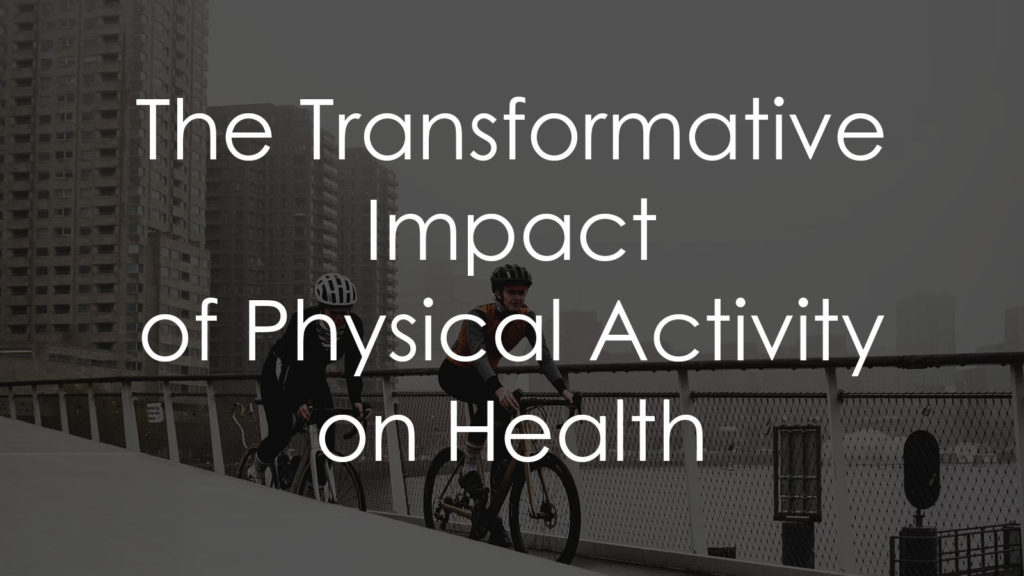Physical activity is not just about breaking a sweat or burning calories; it is a cornerstone of overall health and well-being. Regular exercise offers a multitude of benefits for the body, mind, and spirit, contributing to longevity and vitality. In this article, we will explore the profound impact of physical activity on health and the numerous ways it enhances our lives.

1. Physical Health:
Regular physical activity is associated with a myriad of physical health benefits, including:
- Cardiovascular Health: Exercise strengthens the heart muscle, improves circulation, and helps lower blood pressure and cholesterol levels. Regular aerobic exercise reduces the risk of heart disease, stroke, and other cardiovascular conditions.
- Weight Management: Physical activity helps burn calories, build muscle, and increase metabolism, making it an essential component of weight management and obesity prevention. Regular exercise can help individuals achieve and maintain a healthy weight and body composition.
- Bone Health: Weight-bearing and resistance exercises, such as walking, jogging, and strength training, help build and maintain bone density, reducing the risk of osteoporosis and fractures later in life.
- Metabolic Health: Physical activity improves insulin sensitivity, glucose metabolism, and lipid profiles, reducing the risk of type 2 diabetes and metabolic syndrome.
- Immune Function: Regular exercise enhances immune function, reducing the risk of infections and boosting the body’s ability to fight off illness and disease.
2. Mental Health:
The benefits of physical activity extend beyond the body to include significant improvements in mental health and emotional well-being:
- Mood Enhancement: Exercise stimulates the release of endorphins, neurotransmitters that promote feelings of happiness and well-being. Regular physical activity can help alleviate symptoms of depression, anxiety, and stress, improving mood and emotional resilience.
- Cognitive Function: Physical activity has been shown to enhance cognitive function, memory, and attention span. Regular exercise stimulates neuroplasticity, the brain’s ability to form new connections and adapt to changing demands, leading to improved cognitive performance and reduced risk of cognitive decline with age.
- Stress Reduction: Exercise serves as a powerful stress reliever, helping to reduce the levels of stress hormones like cortisol and adrenaline in the body. Engaging in physical activity can promote relaxation, improve sleep quality, and provide a healthy outlet for managing stress.
- Self-Esteem and Confidence: Regular exercise can boost self-esteem and confidence by promoting a sense of accomplishment, mastery, and self-efficacy. Achieving fitness goals, building strength and endurance, and improving physical appearance can enhance self-perception and body image.
3. Longevity and Quality of Life:
Leading an active lifestyle is associated with increased longevity and improved quality of life:
- Longevity: Numerous studies have demonstrated a strong association between regular physical activity and increased life expectancy. Engaging in regular exercise can help reduce the risk of premature death from chronic diseases and age-related conditions.
- Quality of Life: Physical activity enhances overall quality of life by improving physical function, mobility, and independence. Staying active allows individuals to maintain their ability to perform daily activities, enjoy recreational pursuits, and participate in social interactions, enhancing overall well-being and life satisfaction.
4. Social Connection:
Physical activity provides opportunities for social interaction, camaraderie, and community engagement:
- Group Exercise: Participating in group exercise classes, team sports, or outdoor activities fosters social connections, teamwork, and mutual support, enhancing feelings of belonging and camaraderie.
- Community Events: Community-based physical activity programs, charity walks/runs, and recreational sports leagues bring people together, promoting social cohesion and a sense of community belonging.
- Family Bonding: Engaging in physical activities with family members, such as walking, cycling, or playing sports, strengthens family bonds, promotes communication, and creates lasting memories.
Conclusion
The impact of physical activity on health is profound and multifaceted, encompassing benefits for physical, mental, and emotional well-being. By making regular exercise a priority and incorporating physical activity into daily life, individuals can enjoy a higher quality of life, improved health outcomes, and greater overall happiness and fulfillment. Whether it’s a brisk walk in the park, a vigorous workout at the gym, or a leisurely bike ride with friends, every step towards an active lifestyle contributes to a healthier, happier, and more vibrant life.